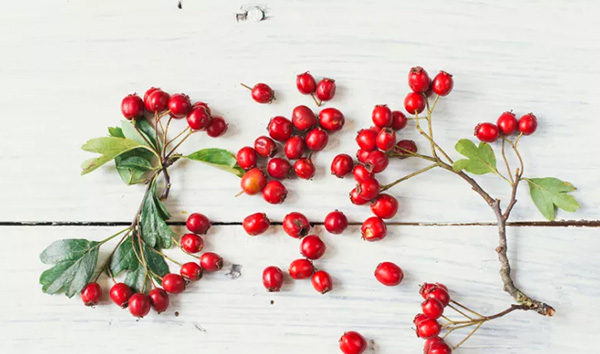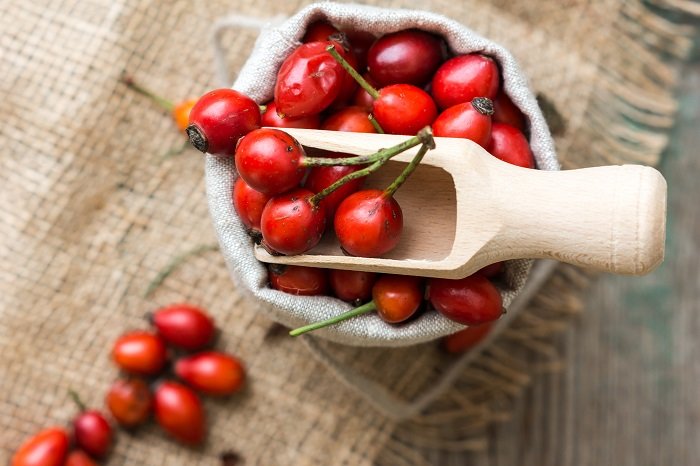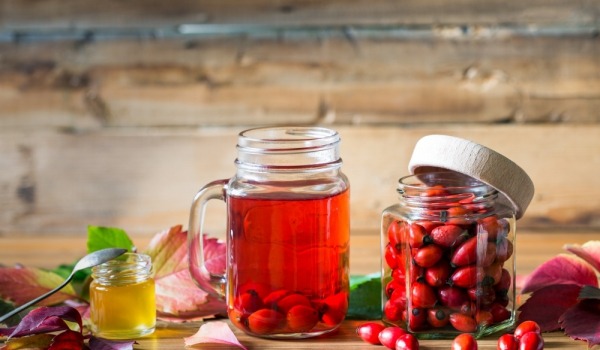Rosehip is a shrub that grows in different parts of our country. Its fruits have a therapeutic effect, which are widely used both in folk and traditional medicine. Rosehip is often given to children to boost immunity. Let’s try to understand the beneficial properties of rose hips, whether it can be given to children, and from what age.

Useful properties of wild rose
First of all, the healing effect of wild rose on the human body is due to the high content of vitamin C. Therefore, it is used as a prophylactic to prevent viral diseases, to treat a lack of ascorbic acid. Especially important is the use of wild rose in winter and late autumn, during the rise in the growth of acute respiratory viral infections and acute respiratory infections. In addition, rose hips are famous for the following qualities:
-
High content of vitamin Adue to which it is used in the presence of problems with the eyes. -
The presence of iron, magnesium, potassium, phosphorus, manganese, calcium. Therefore, rose hips are prescribed to strengthen hair, improve metabolic processes, hematopoiesis, and eliminate anemia. -
Possession of a mild choleretic effect. As a result, the work of the liver is restored. In this case, they use rosehip roots and syrup, which can be purchased at a pharmacy. -
High content of vitamins K, E, group B, polyphenols, organic acids. Due to this, the plant is used to treat and prevent diseases of the gastrointestinal tract, protect the body from radioactive substances. -
Having a diuretic effect. As a result of its use, toxins are excreted from the body along with urine.
Rosehip is often prescribed for forced exposure to open sunlight, as this results in a decrease in the content of vitamin C in the body. Rosehip seed oil is used as a wound healing agent due to its richness in carotene and vitamin E. It is often used to treat cuts, dermatitis, burns, ulcers on the skin.
Harm from taking wild rose
Despite the many useful qualities, rose hips are capable of harm the child’s body against the background of prolonged or excessive use of it:
-
Provoke an exacerbation of gastritis, lead to a stomach ulcer.
-
Against the background of the diuretic effect, wash out calcium, thereby negatively affecting the work of the urinary system.
-
Cause intolerance.
In no case should rose hips be used as therapeutic and prophylactic purposes if the following conditions have been identified in children:
-
Allergic reaction to rosehip.
-
Heart disease.
-
Increased blood clotting.
-
Renal failure.
-
Gastritis.
Is it possible to give to children

Vitamins are found in large quantities in rose hips, and, as you know, these are irreplaceable substances in the body. Especially their role is great in childhood, because it is at this time that intensive growth, formation, development takes place, metabolic processes are more intense. A mass study was conducted at the Research Institute of Nutrition of the European Academy of Medical Sciences, which showed that iron deficiency is found not only in winter and spring, but even in summer and autumn.
The child’s body is under constant stress, and with insufficient intake of vitamins, iron-containing anemia is formed, which requires treatment and prevention. Rosehip is a plant useful for children. But its fruits are given taking into account the age, tolerance of the medicinal plant. After all, it belongs to the category of allergenic. Therefore, the first sample of wild rose should be done with caution.
At what age can you give rose hips to children
Often young parents wonder at what age children can be given rose hips. Despite the fact that they have a rather impressive list of positive qualities, a rose hip drink can give an allergic reaction due to the fact that it contains a wide variety of highly active substances. Therefore, it should not be given in the first six months of life.
In infancy, this product is given only if there is no individual intolerance, subject to strict adherence to the rules that apply to its introduction into the diet. Babies who are not yet a year old This medicinal plant is given only in two forms:
-
From six months, 1 berry in the form of puree mixed with water or used as an additive to fruit puree.
-
From 8 months, 2 pureed berries or 20 ml of decoction, which is prepared on rose hips.
-
After the child is one year old, you can include infusion, compote, tea, jelly from berries in the diet.
-
From 3 years old, syrup, rosehip jam is allowed for use.
It is important to remember that rosehip drink has a diuretic effect, so it is better to give it in the morning. A decoction is especially useful for children during colds and viral diseases, because the immune system of children is not yet perfect, as an immunostimulating agent.
How often and in what dose to give rose hips to children
For the first acquaintance of children with wild rose, the fruits are crushed into puree, diluted with water to the consistency of thick sour cream. After the child is 6 months old, offer him this composition on the tip of a teaspoon and observe the baby for 3 days. If no allergic reactions have appeared during this time, the fruits are introduced on an ongoing basis. But, it is advisable to limit them to three servings per week. First, 1 teaspoon, gradually, by 8 months, the dose increases to 3 teaspoons a day, 3 times a week.
To strengthen the immune system for medicinal purposes, from the age of 5 months, babies are given a decoction of fruits. From the age of 10 months, a drink can be given to quench thirst, but a single dose should not exceed 50 ml, and a weekly dose should not exceed 300 ml. Compotes from berries are offered from the age of one. Their children are allowed to give 3 times a week, 100 ml per day. After the child is 4 years old, a single serving increases to 200 ml.
From the age of one year, you can give rosehip fruit drink, diluted with 45 ml. water, first 1 tablespoon, then two a day. You can not give a drink on an empty stomach. It is better to offer his children to drink from a straw. Since it contains a large amount of vitamin C, which can destroy tooth enamel. Until the age of one year, a rosehip drink is diluted in a ratio of 1 to 6, after a year — 1 to 2.
How to cook rose hips for children
Rosehip is a storehouse of vitamins, highly active substances, therefore, in order to avoid intolerance to this plant, it must be given to children strictly according to the rules, observing the concentration that is recommended at a certain age. Drink for children should not be strong. It is better for kids to give freshly prepared rose hips. Both dried and fresh fruits are used as raw materials. They can be purchased at the market or grown in the garden.
There are many recipes with rose hips. We will offer some of them.
Tea
Rosehip tea is brewed in a thermos as follows:
-
We wash the fruits.
-
We put them in a thermos.
-
Pour in 1 tablespoon of granulated sugar.
-
Pour in a liter of boiling water.
-
We close the lid.
-
We leave for 6 hours.
To make tea, you need 1 tablespoon of rose hips. Tea can also be prepared on the stove.
-
Pour 1 tablespoon of berries with 1 liter of cold water.
-
Let’s stand for 20 minutes. During this time, the water will acquire a reddish tint.
-
Boil on low heat for 15 minutes.
Rose hips are strong, the vitamins in it are not destroyed during prolonged cooking. Tea is given warm to children.
Decoction

In the preparation of decoction, there are slight differences from the preparation of tea. For this purpose, you need to do the following:
-
1 tablespoon of crushed berries is poured into 200 ml. water.
-
Bring to a boil. If the fruits are too hard, then they can be crushed on the stove while boiling water.
-
After that, the broth is left, covered with a towel.
-
Infused for 2 hours.
The decoction can also be prepared in another way:
-
We take the required number of berries.
-
Pour 300 ml. water.
-
Place in an enamel bowl.
-
We cover with a lid.
-
Simmer in a water bath for 15 minutes.
-
We filter.
-
Add boiled water to it to the original volume.
Infusion
To prepare the infusion you need:
-
Rinse the rose hips, 1 tablespoon is enough for children.
-
Grind them.
-
Place in a thermos.
-
Pour 200 ml of boiling water.
-
Let it brew for 2 hours.
-
Strain through double cheesecloth.
Syrup
Rosehip syrup can be bought ready-made at a pharmacy. If there is a wild rose bush in the summer cottage, then you can cook it yourself.
-
We wash the berries.
-
We clean them from the stalks.
-
Fill with boiling water.
-
We insist 10 minutes.
-
Pour 400 gr. into 200 ml of water. sugar, cook over low heat or a water bath until thickened.
-
Pour into the decoction.
-
We mix.
-
Put in sterile jars.
-
Roll up the lids.
-
We put it in the refrigerator.
To prepare a decoction for syrup, 400 gr. fruit is taken 500 ml. boiling water.
Paste
To prepare the paste, you need to rinse the rose hips, remove the seeds, mix with sugar, in a ratio of 1 to 1. Grind the resulting mass in a blender, place in jars, tighten the lid. The blank is used for making compotes, jelly, as a filling for pies.
Kissel
It is good for children to cook jelly, to enhance their beneficial properties, you can cook on the basis of rose hips.
-
Rinse with 100 gr. fruits.
-
Pour 500 ml. water.
-
Cook over low heat covered for 15 minutes.
-
Leave to infuse for 4 hours.
-
Add 4 tablespoons of sugar, stir.
-
Strain.
-
Pour into 100 ml. the resulting broth 20 gr. starch.
-
Mix.
-
Bring the remaining broth to a boil.
-
Whisking constantly, add starch.
-
Boil 3 minutes.
-
Leave until cool.
To prevent the jelly from being covered with a film, you can sprinkle with a small amount of sugar.
Is it possible to give rose hips to allergenic children
Children who suffer from allergies represent a special category against the backdrop of a limited set in their diet. Often they are deficient in vitamins and trace elements necessary to improve the immune system. Therefore, the Scientific Center for Children’s Health of the European Academy of Medical Sciences with the Research Institute of Nutrition conducted a study on the introduction of rose hips into their diet. Under observation were 27 children suffering from various forms of allergies. In addition, they had concomitant diseases in the form of chronic tonsillitis and digestive organs. In order to enrich the body with vitamins, they were prescribed a rosehip decoction at a dose recommended for age.
The treatment was carried out for 3 weeks. During this period, there was not a single case of refusal to take, manifestations of a negative reaction from the body. Against the background of saturation of children with decoction, an increase in hemoglobin in the blood was noted. As a result of the study, a good tolerance of rose hips by allergenic children was noted. Thanks to this, pediatricians were able to recommend this category of rosehips to equip the body with vitamins, strengthen their immune system, prevent hypovitaminosis, and anemia. But, the use of rose hips by children suffering or prone to allergies is possible only under the supervision of an allergist.
Rosehip can be given to children from an early age, provided that there is no individual intolerance. Its fruits are rich in vitamins, microelements, and are of great benefit to a growing organism. Before giving rose hips to children, you need to consult a pediatrician about the possibility and dosage.

Добавить комментарий
Для отправки комментария вам необходимо авторизоваться.